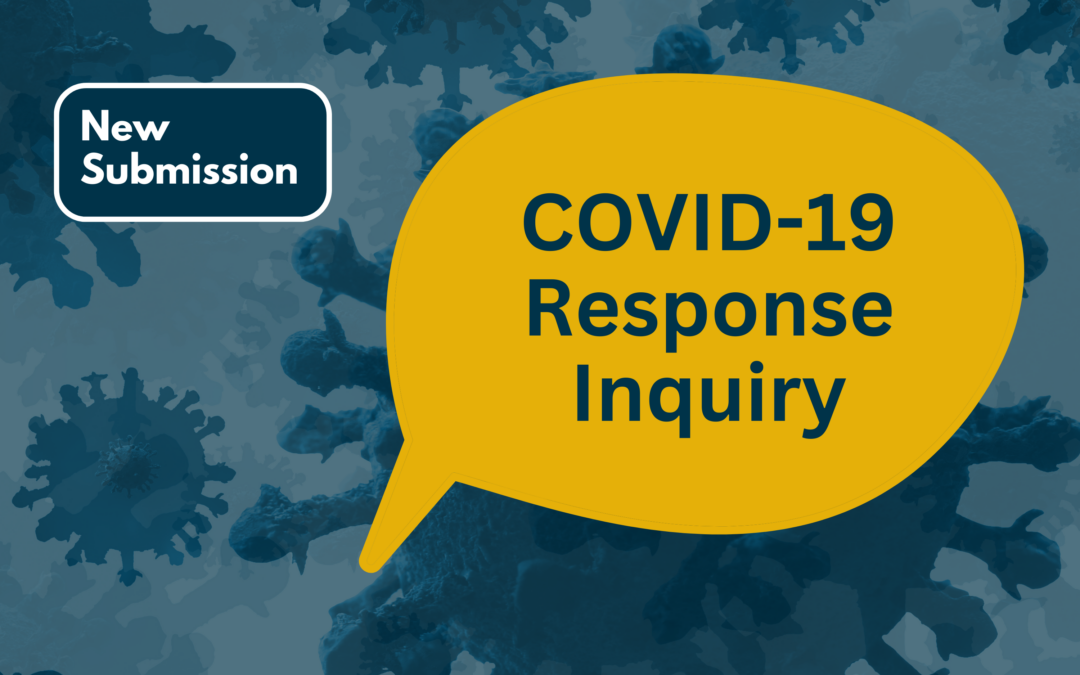DANA recently wrote a brief submission to the Commonwealth Government COVID-19 Response Inquiry, attaching and linking to previous relevant work. This inquiry is being conducted by an independent panel with extensive experience across public health, health, social care, government and economics. The independent panel is being be supported by a taskforce, based within the Department of Prime Minister and Cabinet (PM&C) (similar to the NDIS Review, which was supported by secretariat located in PM&C). This inquiry is considering responsibilities under the Commonwealth government (and not State and Territory actions) to improve responses in the event of future pandemics. We are pleased that the terms of reference include a focus on “community supports” and “mechanisms to better target future responses to the needs of particular populations” (including people with disability).
Undoubtedly, the disability community has been one of the groups most impacted during the ongoing COVID-19 pandemic. Not only are people with disability at greater risk of serious illness, complications and death from infections like COVID-19, but the Disability Royal Commission (DRC) also found that during the pandemic, people with disability were at greater risk of experiencing violence, abuse, neglect and exploitation. Better mechanisms are definitely needed to target future pandemic responses to the needs of people with disability, among other diverse population groups. We also argued in our submission that independent disability advocacy is one of the community supports that can enable people with disability to access vital services related to education, housing, domestic violence or help with daily living.
In times of disaster, disability advocacy organisations provide crucial support to people with disability, helping them regain access to essential supports, navigate crisis-ridden systems, and develop accessible communication materials. However, as many advocates who have worked on the front line during the last few years are painfully, this assistance significantly increases organisations’ workloads and poses financial and long-term sustainability challenges due to inadequate resourcing.
This is why our recent Pre-Budget Submission calls for tripling of funding for the independent advocacy sector to meet unmet demand and need, and also specifically identifies support for advocacy during disasters as one of several critical areas for targeted investment. We call for $2,000,000 be provisioned in a Disability Disaster Management Fund for advocacy organisations to – subject to Ministerial fiat – draw from to provide high-intensity emergency supports and additional human resourcing during disasters.
In the context of the growing awareness of the need for emergency planning and crisis response to include and involve people with disability, DANA chose ‘Fires, Floods and COVID19’ as one of four topics of focus during our engagements to inform the NDIS Review this year. We published a Discussion Paper authored by Elly Demarschelier that summarised evidence, articulated problems and proposed solutions that would assist in future pandemics and in other emergencies or disasters:
- Establish a Disability Disaster Management Centre
- Invest in person-centred emergency preparedness
- Permit flexible use of NDIS funds during disasters
- Develop a Workforce Disaster Surge Plan for the NDIS
- Establish a specific disaster funding stream for advocacy organisations
- Strengthen safeguards.
(To read examples and additional solutions that DANA heard during our engagement with advocates and people with disability, please refer to the relevant Summary Report.)
During the pandemic, disability advocacy, representative and peer support organisations assumed an active information-sharing role, creating or disseminating accessible resources, and proactively seeking out people with disability at risk in the community or, where possible, reaching into closed or segregated settings. However, as we explored in this 2022 Submission on Independent Disability Advocacy, the sector fulfilling these vital crisis response functions exacerbated the existing strain from chronic under-funding, and diverted efforts from the more developmental and preventative work of rights education and awareness raising, capacity building and early stage problem-solving and dispute resolution.
These issues of unmet demand and need for independent disability advocacy have been evidenced by DANA’s extensive engagement with the sector, including through two reports of surveys conducted during 2020:
- DANA Snapshot of COVID-19 Advocacy Demand captures insights from disability advocacy services in late April to early May 2020, confirmed that demand had increased significantly in key areas and many organisations were not able to meet this increased demand, in-part due to the sector already operating at or over capacity.
- Lessons for Disaster Preparedness (March 2021) – Report on the impact of COVID-19 disaster management for people with disability and the advocacy sector, with preliminary advice for future disaster management – analysing survey responses from November 2020.
We heard that the sector’s workforce was overstretched and at greater risk of burn-out and vicarious trauma due to urgency of immediate need. We know many of our member organisations had to pivot from planned activities and projects (including supporting people with disability to engage with the Disability Royal Commission processes) to redirect their efforts to meeting the immediate demand and working to address the risks to the safety, health and wellbeing of the people with disability for whom they advocate and inform.
The need to ensure organisations are better equipped and resourced next time, has informed our current campaign to SPEAK UP for Independent Advocacy, as our member organisations around the country are focused on safeguarding the rights and health of people with disability who might otherwise fall through the cracks of government responses during emergencies.
You can read the full submission here.

